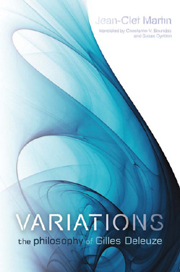Book contents
- Frontmatter
- Contents
- Letter-Preface by Gilles Deleuze
- Preambles
- First Variation: Ethics and Aesthetics
- Second Variation: Three Poetic Formulas for Nomadic Distribution
- Third Variation: Multiplicities
- Fourth Variation: Malcolm Lowry, or, the Manifesto of Things
- Postscript to the Anglo-American Edition: What is a Multiplicity?
- Notes
- Bibliography
- Index
Letter-Preface by Gilles Deleuze
Published online by Cambridge University Press: 12 September 2012
- Frontmatter
- Contents
- Letter-Preface by Gilles Deleuze
- Preambles
- First Variation: Ethics and Aesthetics
- Second Variation: Three Poetic Formulas for Nomadic Distribution
- Third Variation: Multiplicities
- Fourth Variation: Malcolm Lowry, or, the Manifesto of Things
- Postscript to the Anglo-American Edition: What is a Multiplicity?
- Notes
- Bibliography
- Index
Summary
In reading you, I appreciate that your preoccupation with my work shows such a thorough understanding. Here, I will try to respond to some of your remarks, although more often than not the differences between the two of us are a question of language.
1. I believe in philosophy as a system, but I dislike the notion of system when people relate it to the coordinates of the Identical, the Similar and the Analogous. I believe that Leibniz was the first to identify system with philosophy and I agree with the sense he gives this identification. The questions on ‘overcoming philosophy’ or ‘the death of philosophy’ have never impressed me. I feel I am very classical. The system must not only be in perpetual heterogeneity, it must be in heterogenesis, and it seems to me this has never been tried before.
2. From this point of view, what you say about metaphor, or rather against it, strikes me as correct and profound. I only want to add something which in no way contradicts what you have said, but rather follows a similar direction: the double turning away or treason seems to refer to operations that establish a radical immanence – they are the trace of immanence. The essential connection with the Earth is derived from this.
3. You really grasp the meaning that the definition of philosophy – as an invention or creation of concepts – has for me. This means that philosophy is neither contemplative nor reflexive nor communicative; it is, rather, a creative activity. I believe it has always been that, but I have not yet been able to fully explain myself on this point. This is why I would so much like my next book to be a short text on What is Philosophy?
4. […]
- Type
- Chapter
- Information
- VariationsThe Philosophy of Gilles Deleuze, pp. vii - viiiPublisher: Edinburgh University PressPrint publication year: 2010

